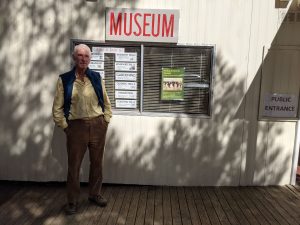Online showing the way with sport
By JAMES FENNESSY
The days of the revered journalist who would announce the evening news in a dull yet purely professional manner or arrive at a sporting event with a fedora are all but gone. In 2010 all you need is a username, website and a digital camera and you can be an online journalist, photographer and publisher. As well as amateur news sites and blogs, professional online news is readily available and has rapidly become one of the quickest and easiest ways for people to acquire their news. But how does online news compare with the traditional journalism practices of print, radio and television?
Print and Online Sports Journalist for the Canberra Times Chris Dutton says online journalism is miles ahead of the traditional media.
“It’s definitely more immediate,” he said. “News is up straight away and it can be changed quickly if mistakes are made.
“If you print a mistake in a newspaper, it’s there forever and impossible to change.”
One man who believes online journalism has brought about massive change to the media industry is local radio presenter for 1206AM 2CC, Mike Welsh.
“Online coverage has blown the traditional media apart and it has changed the game forever,” Welsh said.
“If you want the five latest breaking news stories, you don’t have to pick up a paper or turn on the radio, you can get it from your iphone.
“Some old timers don’t like online news, but not to embrace it is foolish. It’s here to stay.”
With so much speed, accuracy, open-endedness and breaking news; is online journalism the paramount class of news in the 21st century?
Although people may not get a half hour package of local or national news online, the public has the option of reading, viewing or listening to any news that takes their fancy.
Chris Dutton said online news gives people the option of one thousand different editions of a regular newspaper.
“Online journalism is still evolving but with different pictures and breaking stories it gives the consumer more options,” Dutton said.
“A lot of revenue is made through online advertising and if companies want to make money, they need to have a good website.”
Dutton said like traditional media, the online market is highly competitive.
“For local stories we will try and beat the ABC to the internet and for national stories we’ll try and beat the Sydney Morning Herald and the Daily Telegraph,” Dutton said.
“If we get a story up before other news organisations, when people google that story, ours comes up at the top of the page and therefore brings more people to our website.”
Online journalism is competitive, eager to break stories and have interesting content but does it carry the same news values as the traditional media?
Most forms of journalism around the world will have similar news values in regards to content, such as conflict, currency and prominence.
However what about proximity? Take the recent story about Canberra Raider’s center, Joel Monaghan, who was caught on camera in a lewd act with a dog in what was meant to be a practical joke among friends.
An anonymous punter posted the photograph of Monaghan with his pants down on the internet which ended with the Australian representative quitting the National Rugby League.
This was a local story that was the biggest breaking story online and could be found on every Australian newspapers website. However every newspaper did not run the story on the front and back page of the paper like in Canberra and Sydney.
Mike Welsh hosts his own afternoon radio show on 2CC and had the anonymous man on the air, not long after the story broke.
“We had to change his voice because he wanted to remain anonymous for obvious reasons,” Welsh said.
“It was online which broke this story but traditional media didn’t want to touch it to begin with.
The editor of the Daily Telegraph knocked back an interview with the anonymous man, saying it was too grubby.”
After the Monaghan story broke, it spread like wild fire, popping up on websites in England and radio talk shows all over the world.
If this story broke 30 years ago, the news would have been lucky to make it into a newspaper outside of Canberra. However with fast paced online technology, it spread across the country, then the world in a matter of hours resulting in serious consequences for Joel Monaghan.
Someone who did not have any consequences was the anonymous man who posted the photograph for the world to see.
Canberra Raiders media manager Ben Pollock said while online journalism can be professional, some ‘news’ sites and social media sites have too much freedom.
“People have the ability to become reporters themselves and post images like the one of Joel without consequence,” Pollock said.
“If it was a television or radio station or a newspaper they would face serious litigation but because it wasn’t, this person gets off with no consequences.
They don’t have to go to university or face an editor and a lot of the ‘news’ websites just talk dribble.”
Pollock said that reputable organisations are upholding current news values but admits that social media and independent news sites are only going to get bigger.
“It has made the media completely different to ten years ago, journalists used to have to go out and find people to interview but now they can just go online and see the opinion of others or check the Raiders website and quote people,” Pollock said.
“New online news websites pop up every couple of months and it’s only getting bigger so organisations like the AFL and the NRL need to learn how to manage it.”
Monaghan’s story had more impact in online news. When it was broadcast on radio, news presenters might have said one or two sentences about it. People would hear that, then go straight to the internet to find out more.
In order to draw in readers organisations need to have an impact which may mean different material that is not repetitive and boring and with constant updates that is a major advantage of online news.
Chris Dutton said the Monaghan story went from the internet to the Canberra Times, to other newspapers and then to radio and television.
“Our journos put up the bare facts then worked the phones to try and get something different to what was online,” Dutton said.
“A lot of the time it is old news, like with the Monaghan story you can’t write his career is in jeopardy because people know that so you have to put a different angle on it to make it new news and that’s what online is great for.”
Online journalism could be viewed as challenging for traditional journalists because there are so many websites out there, and online journalists are striving to get that extra bit of the story to keep it fresh and up-to-date.
Online journalism seems to be viewed by most people as a convenient and helpful platform but do the methods used in online journalism detract from coverage of major issues?
Mike Welsh said online news can only be viewed as a positive, especially for people in his line of work.
“With links and updates it’s great because on air we change all the time, so it’s handy for us and the daily punter who wants to gets his up-to-date news fix,” Welsh said.
“In radio you can add more to a certain extent and although there is a lot of pressure on online news outlets to get stuff out there, they can add or take away as much as they like.”
Ben Pollock said online journalism can be very professional depending on which organisation is covering the news.
“The thing is that now days anyone can be an online journalist and post their opinion and photos and it’s getting out of control,” Pollock said.
“Sporting organisations like the Raiders are getting loads of requests from media organisations [that are actually non-professional websites that a person has created] to get media accreditation to our events.”
The world wide web offers a space for all kinds of people to create sites and post what they know or what they think they know in order to have their views publicly discussed.
It is apparent that bloggers and journalists are both seeking to have their stories put into the public domain. However as Ben Pollock suggested, bloggers have no one to answer to in regards to plagiarism, defamation and unethical journalism.
Traditional journalism is both social and personal and has to meet certain standards and exist within a set of ethical boundaries. Bloggers do not have these boundaries and can publish whatever outlandish content they like.
Online journalists that work for reputable organisations will continue to provide up-to-date, speedy and accurate news and some bloggers will do the same while others will continue to slander, defame and talk nonsense. Either way professional journalists and free roaming bloggers are both here to stay.




Be the first to comment!